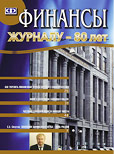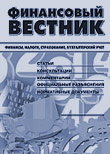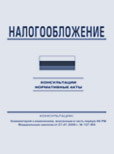Содержание
ФИНАНСЫ И БЮДЖЕТ: ПРОБЛЕМЫ И РЕШЕНИЯ
Н.Е. Барбашова, старший научный сотрудник Института прикладных экономических исследований РАНХиГС (г. Москва), кандидат экономических наук
E-mail: barbashova-ne@ranepa.ru
М.А. Маракуева, научный сотрудник НИУ ВШЭ (г. Санкт-Петербург), кандидат экономических наук
E-mail: Mmarakueva@hse.ru
В 2020 г. в бюджетном законодательстве Российской Федерации появилась норма, допускающая предоставление горизонтальных (межрегиональных и межмуниципальных) бюджетных кредитов. Однако на практике данный инструмент применяется регионами и муниципальными образованиями крайне редко. В данной статье рассматриваются причины ограниченной востребованности горизонтальных бюджетных кредитов в России и анализируются возможные перспективы развития и совершенствования этого механизма бюджетной политики.
Ключевые слова: бюджетные кредиты, горизонтальные межбюджетные отношения, региональный бюджет, местный бюджет.
М.А. Клишина, старший научный сотрудник Центра перспективного финансового планирования, макроэкономического анализа и статистики финансов НИФИ Минфина России, кандидат юридических наук
E-mail: mklishina@rb-centre.ru
О.В. Манусаджян, старший научный сотрудник Центра перспективного финансового планирования, макроэкономического анализа и статистики финансов НИФИ Минфина России, кандидат экономических наук
E-mail: ovm@rb-centre.ru
Координация между федеральным и региональным уровнями в рамках достижения показателей национальных проектов и реализации государственных программ Российской Федерации сопряжена с большими объемами административного взаимодействия, связанного с предоставлением межбюджетных трансфертов и заключением различных соглашений. Субсидии субъектам Российской Федерации составляют почти половину всех предоставляемых из федерального бюджета межбюджетных трансфертов, что указывает на их важнейшую роль в системе межбюджетных отношений в Российской Федерации. В статье рассматриваются проблемные вопросы организации предоставления межбюджетных субсидий, а также возможности и ограничения оптимизации количества соглашений между федеральными органами исполнительной власти и субъектами Российской Федерации.
Ключевые слова: государственные программы, межбюджетные отношения, межбюджетные трансферты, субсидии субъектам Российской Федерации, соглашения о предоставлении субсидий, нефинансовые соглашения, единая субсидия.
НАЛОГИ: ТЕОРИЯ И ПРАКТИКА
М.М. Юмаев, профессор кафедры налогов и налогового администрирования Факультета налогов, аудита и бизнес-анализа Финансового университета при Правительстве Российской Федерации, доктор экономических наук
E-mail: MMYumaev@fa.ru
М.В. Прусова, ведущий аудитор ООО «Правовест Аудит»
E-mail: info+7248873@pravovest-audit.ru
В статье исследуется вопрос определения правовой природы целевых отчислений от азартных игр, направляемых на финансирование мероприятий по развитию спорта. Анализируются зарубежные формы финансирования спорта и налогообложения доходов от азартных игр. Рассматриваются механизм администрирования целевых отчислений, проблема недостаточного контроля за распределением целевых отчислений конкретными получателями средств. По результатам исследования сделан вывод о квазиналоговом характере отчислений на развитие спорта, выявлены недостатки нормативно-правового регулирования механизмов целевого расходования средств и отсутствие ответственности за соблюдение целевого характера расходов. Определены перспективы совершенствования российского налога на игорный бизнес путем перехода на налогообложение результатов деятельности игорных заведений. Обоснована целесообразность использования при распределении отчислений алгоритмов государственного финансирования в рамках государственных программ и национальных проектов, а также контрактной системы закупок для государственных и муниципальных нужд. Сформулированы предпосылки передачи налоговым органам функции администрирования целевых отчислений.
Ключевые слова: отчисления на развитие спорта, налог на игорный бизнес, доходы от азартных игр, букмекерская контора, тотализатор, финансирование профессиональных спортивных объединений, налоговое администрирование.
Е.В. Ядренникова, доцент кафедры финансового и налогового менеджмента Уральского федерального университета имени первого Президента России Б.Н. Ельцина, кандидат экономических наук
E-mail: elena.yadrennikova@mail.ru
А.В. Лазуренко, доцент кафедры финансового и налогового менеджмента Уральского федерального университета имени первого Президента России Б.Н. Ельцина
E-mail: nvtmgn@gmail.com
Цель исследования состоит в разработке предложений по совершенствованию системы акцизного налогообложения в РФ путем включения пальмового масла в перечень подакцизных товаров для повышения эффективности выполнения ею как фискальной, так и регулирующей функций налогообложения. В статье проводится анализ объема ввоза и потребления пальмового масла в РФ и обосновываются необходимость включения пальмового масла в перечень подакцизных товаров, а также тип и размер ставок по указанному товару. Авторами сделан вывод, что реализация предлагаемых нововведений позволит увеличить налоговые поступления в государственный бюджет и будет способствовать сокращению потребления продуктов, содержащих пальмовое масло, а также сохранению здоровья населения страны.
Ключевые слова: акцизы, подакцизные товары, пальмовое масло, ценовая эластичность спроса, налоговые ставки, доходы бюджета.
СТРАХОВАНИЕ
В.П. Авдотьин, доцент Аграрно-технологического института Российского университета дружбы народов им. Патриса Лумумбы
E-mail: avdotinvp@mail.ru
Л.В. Палинкаш, сотрудник экономического факультета Московского государственного университета им. М.В. Ломоносова
E-mail: lpalinkash@yandex.ru
Ю.С. Авдотьина, советник Департамента образовательной и научно-технической деятельности МЧС России, полковник внутренней службы
E-mail: juli52609@mail.ru
В статье представлен всесторонний анализ страхования объектов массового пребывания людей от террористических атак. Одним из ключевых выводов является то, что страхование объектов массового пребывания людей от террористических атак должно быть комплексным и системным. Важно отметить, что проведенное авторами исследование подчеркивает понимание последствий страхования от терроризма, одновременно выявляя пробелы в этой области, которые требуют дальнейшего изучения, расширяет понимание сложной предметной области. Авторами предложен ряд мер, направленных на всесторонний учет потребностей экономики и населения в защите от террористических атак мест массового пребывания населения.
Ключевые слова: террористический акт, страхование террористических рисков, объекты массового пребывания людей.
ФИНАНСОВЫЕ РЫНКИ
З.М. Султанова, начальник отдела финансовой статистики Евразийской экономической комиссии (г. Москва), доктор экономических наук
E-mail: zsultanova@bk.ru
А.М. Белобородько, доцент кафедры государственного и муниципального управления Негосударственного образовательного частного учреждения высшего образования «Московский экономический институт» (г. Москва), кандидат экономических наук
E-mail: alex_belob@mail.ru
В статье проводится оценка уровня развития интеграционных процессов в Евразийском экономическом союзе (ЕАЭС) в период 2015–2024 гг. и перспектив их углубления в среднесрочной перспективе. Новизна статьи заключается в анализе предпосылок формирования единой валютной зоны в странах ЕАЭС с учетом Декларации о дальнейшем развитии интеграционных процессов в рамках Евразийского экономического союза. Объектом анализа является формирование общего финансового рынка, механизма создания новых финансовых инструментов, привлечения и перераспределения финансовых ресурсов внутри ЕАЭС. Предметом исследования является развитие общей валютной зоны в ЕАЭС. Авторы разрабатывают критерии для оценки межгосударственных проектов и целевых программ, направленных на формирование валютной зоны ЕАЭС. В контексте теории оптимальных валютных зон Роберта Манделла и представителей Чикагской школы авторы рассматривают возможные сценарии валютной интеграции для стран ЕАЭС. На основании сделанных выводов предлагается: с функциональной точки зрения важно постепенно развивать не только валютный рынок, но и все сегменты общего финансового рынка, включая фондовый, кредитный и страховой; при развитии общей валютной зоны необходимо учитывать ее особенности: низкие макро- и микроэкономические показатели стран, недостаточное использование взаиморасчетов в национальных валютах ЕАЭС и преобладание мировых валют.
Ключевые слова: валютная зона, валютный союз, Евразийский экономический союз, взаимная торговля, взаимные инвестиции, национальные валюты, трансграничные расчеты, финансовые потоки.
МНЕНИЯ
С.Е. Демидова, доцент кафедры общественных финансов Финансового факультета Финансового университета при Правительстве Российской Федерации, кандидат экономических наук, доцент
E-mail: sedemidova@fa.ru
Статья посвящена анализу показателей восстановления и развития туризма в стране в условиях активизации государственных мер поддержки и финансового стимулирования. Актуальность работы обусловлена возрастанием значимости туризма в системе национального хозяйства на стратегическом горизонте.
Ключевые слова: туризм, бюджетные ассигнования на развитие туризма, государственная программа «Развитие туризма», эффективность государственного финансового стимулирования туризма.
О.В. Умгаева, ведущий научный сотрудник Центра исследований в области государственного регулирования отрасли драгоценных металлов и драгоценных камней Научно-исследовательского финансового института Минфина России, доцент Калмыцкого государственного университета имени Б.Б. Городовикова, кандидат экономических наук
E-mail: oumgaeva@nifi.ru
Любой бизнес исходя из экономического смысла своего предназначения является конкурентным. Таковым является и бизнес сферы драгоценных металлов, драгоценных камней (ДМДК) и изделий из них. Бизнес с ожидаемо высокой долей прибыли входит в зону интересов государства, им контролируется и регулируется. Конкуренция является фактором, способствующим улучшению качества изделий, сдерживающим рост цен, расширяющим линейку предлагаемых товаров, в то же время ограничивающим рост объемов производства и реализацию драгоценных изделий отдельными производителями. Задача правильной оценки слагаемых конкуренции с позиции бизнеса и государства направлена на выбор наиболее успешной стратегии продвижения товара, способствующей увеличению объемов оборота ювелирной продукции из ДМДК и, соответственно, получаемой прибыли.
Ключевые слова: конкуренция, ювелирные изделия, драгоценные металлы, драгоценные камни, ювелирный бизнес, спрос, инфляция, мода.
ИНФОРМАЦИЯ
E-mail: finance-journal@mail.ru
Представлена информация об итогах недели финансовой грамотности, проходившей в преддверии начала учебного года в Москве с 23 по 29 августа в рамках форума-фестиваля «Территория будущего. Москва 2030». В просветительском марафоне для всей семьи активное участие приняли более 35 тыс. москвичей и гостей столицы всех возрастов. Всю неделю ведущие эксперты в сфере финансов делились практическими советами и помогали разобраться во всех вопросах управления личными и семейным финансами, было представлено более 50 лекционных программ, многочисленные разнообразные практические занятия, мастер-классы, открытые разговоры, кинолектории, а для юных участников были организованы финансовые приключения с интерактивными играми, мультфильмами, квизами и викторинами. Подводя итоги и отмечая важность мероприятия, министр Правительства Москвы, руководитель Департамента города Москвы Е.Ю. Зяббарова отметила, что «финансово грамотные горожане – залог устойчивого развития мегаполиса. Они создают культуру разумного потребления и сбережения, формируют здоровую экономическую среду».
Ключевые слова: финансовая грамотность, семейные финансы, сбережение, управление личными финансами, финансовое поведение, финансовая безопасность.
Content
FINANCE AND BUDGET: PROBLEMS AND SOLUTIONS
N.E. Barbashova, Senior Researcher, Institute for Applied Economic Research, RANEPA (Moscow), Candidate of Economic Science
E-mail: barbashova-ne@ranepa.ru
M.A. Marakueva, Researcher, HSE (Saint Petersburg), Candidate of Economic Science
E-mail: Mmarakueva@hse.ru
Since 2020 horizontal (interregional and intermunicipal) budget loans appeared in the budget legislation of the Russian Federation. However, in practice, this instrument is used by regions and municipalities extremely rarely. This article examines the reasons for the limited demand for horizontal budget loans in Russia and analyzes possible prospects for the development and improvement of this fiscal policy tool.
Keywords: budget loans, horizontal interbudgetary relations, regional budget, local budget.
M.A. Klishina, Senior Researcher, Center for Advanced Financial Planning, Macroeconomic Analysis and Finance Statistics, NFI of the Ministry of Finance of Russia, Candidate of Law
E-mail: mklishina@rb-centre.ru
O.V. Manusadzhyan, Senior Researcher, Center for Advanced Financial Planning, Macroeconomic Analysis and Finance Statistics, NFI of the Ministry of Finance of Russia, Candidate of Economic Sciences
E-mail: ovm@rb-centre.ru
Coordination between the federal and regional levels in achieving the indicators of national projects and the implementation of state programs of the Russian Federation is associated with large volumes of administrative interaction related to the provision of interbudgetary transfers and the conclusion of various agreements. Subsidies to the constituent entities of the Russian Federation account for almost half of all interbudgetary transfers provided from the federal budget, which indicates their most important role in the system of interbudgetary relations in the Russian Federation. The article examines the problematic issues of organizing the provision of interbudgetary subsidies, as well as the possibilities and limitations of optimizing the number of agreements between federal executive bodies and constituent entities of the Russian Federation.
Keywords: government programs, intergovernmental relations, intergovernmental transfers, subsidies to the constituent entities of the Russian Federation, agreements on the provision of subsidies, non-financial agreements, a single subsidy.
TAXES: THEORY AND PRACTICE
M.M. Yumaev, Professor, Department of Taxes and Tax Administration, Faculty of Taxes, Audit and Business Analysis, Financial University under the Government of the Russian Federation, Doctor of Economics
E-mail: MMYumaev@fa.ru
M.V. Prusova, Lead Auditor, Pravovest Audit LLC
E-mail: info+7248873@pravovest-audit.ru
The article examines the issue of determining the legal nature of targeted payments from gambling revenue at financing sports development activities. Foreign forms of sports financing and taxation of gambling income are analyzed. The mechanism of administration of target payments, the problem of insufficient control over the distribution of target payments by specific recipients of funds is considered. According to the results of the study, a conclusion was made about the quasi-tax nature of payments for the development of sports, shortcomings of regulation of mechanisms for targeted spending and lack of responsibility for compliance with the targeted nature of expenses were revealed. The prospects for improving the Russian gambling tax by switching to taxation of the results of gambling establishments' activities have been determined. The expediency of using public financing algorithms in the allocation of payments within the framework of state programs and national projects, as well as a contractual procurement system for state and municipal needs, is substantiated. The prerequisites for transferring the function of administration of targeted payments to the tax authorities are formulated.
Keywords: payments for the development of sports, gambling tax, gambling income, bookmaker, totalizator, financing of professional sports associations, tax administration.
E.V. Yadrennikova, Associate Professor, Department of Financial and Tax Management, Ural Federal University named after the First President of Russia B.N. Yeltsin, Candidate of Economic Sciences
E-mail: elena.yadrennikova@mail.ru
A.V. Lazurenko, Associate Professor, Department of Financial and Tax Management, Ural Federal University named after the first President of Russia B.N. Yeltsin
E-mail: nvtmgn@gmail.com
The purpose of the study is to develop proposals for improving the excise tax system in the Russian Federation by including palm oil in the list of excisable goods to increase the efficiency of its fulfillment of both fiscal and regulatory taxation functions. The article analyzes the volume of import and consumption of palm oil in the Russian Federation and justifies the need to include palm oil in the list of excisable goods, as well as the type and size of rates for this product. The authors concluded that the implementation of the proposed innovations will increase tax revenues to the state budget and will help reduce the consumption of products containing palm oil, as well as preserve the health of the country's population.
Keywords: excise taxes, excisable goods, palm oil, price elasticity of demand, tax rates, budget revenues.
INSURANCE
V.P. Avdotin, Associate Professor, Agrarian and Technological Institute, Peoples' Friendship University of Russia named after Patrice Lumumba
E-mail: avdotinvp@mail.ru
L.V. Palinkash, employee of the Faculty of Economics, Lomonosov Moscow State University
E-mail: lpalinkash@yandex.ru
Yu.S. Avdotina, Advisor to the Department of Educational, Scientific and Technical Activities of the EMERCOM of Russia, Colonel of the Internal Service
E-mail: juli52609@mail.ru
The article provides a comprehensive analysis of the insurance of objects of mass stay of people from terrorist attacks. One of the key conclusions is that insurance of objects of mass stay of people from terrorist attacks should be comprehensive and systemic. Importantly, the study conducted by the authors highlights the understanding of the effects of terrorism insurance while identifying gaps in this area that require further investigation, broadens the understanding of the complex subject area. The authors proposed a number of measures aimed at comprehensively taking into account the needs of the economy and the population in protecting places of mass stay of the population from terrorist attacks.
Keywords: terrorist act, insurance of terrorist risks, objects of mass stay of people.
FINANCIAL MARKETS
Z.M. Sultanova, Head of the Financial Statistics Division, Eurasion Economic Commission, Doctor of Economics
E-mail: zsultanova@bk.ru
A.M. Beloborodko, Associate Professor, Department of State and Municipal Administration, Non-State Educational Private Institution of Higher Education "Moscow Economic Institute" (Moscow), Candidate of Economic Sciences
E-mail: alex_belob@mail.ru
The article presents an assessment of the level of development of integration processes in the Eurasian Economic Union (EAEU) in the period 2015–2024 and the prospect of their deepening in the medium term. The novelty of the article lies in the analysis of the prerequisites for the formation of a common currency zone in the countries of the EAEU, taking into account the ‘Declaration on the further development of integration processes within the Eurasian Economic Union’. The object of analysis is the formation of a common financial market, the mechanism for creating new financial instruments, attraction and redistribution of financial resources within the EAEU. The subject of the study is the development of a common currency zone in the EAEU. The authors develop criteria for evaluating interstate projects and target programmes aimed at the formation of the EAEU currency zone. In the context of the theory of optimal currency zones of Robert Mundell and representatives of the Chicago School, the authors consider possible scenarios of currency integration for the EAEU countries. Based on the conclusions drawn it is proposed: from the functional point of view it is important to gradually develop not only the currency market, but also all segments of the common financial market, including stock, credit and insurance markets; in the development of the common currency zone it is necessary to take into account its peculiarities: low macro and microeconomic indicators of the countries, insufficient use of mutual settlements in national currencies of the EAEU and the predominance of world currencies.
Keywords: currency zone, currency union, Eurasian Economic Union, mutual trade, mutual investments, national currencies, cross-border settlements, financial flows.
OPINIONS
S.E. Demidova, Associate Professor, Department of Public Finance, Financial Faculty of the Financial University under the Government of the Russian Federation, Candidate of Economic Sciences, Associate Professor
E-mail: sedemidova@fa.ru
Any business, based on the economic meaning of its purpose, is competitive. This is also the business of the sphere of precious metals, precious stones (DMDK) and products made from them. The business, with an expected high profit share, is included in the zone of interests of the state, it is controlled and regulated by it. Competition is a factor contributing to improving the quality of products, restraining price increases, expanding the range of products offered, at the same time limiting the growth of production volumes and the sale of precious products by individual manufacturers. The task of correctly assessing the components of competition, from the point of view of business and the state, is aimed at choosing the most successful product promotion strategy, contributing to an increase in the turnover of jewelry products from DMDK and, accordingly, the profit received.
Keywords: competition, jewelry, precious metals, precious stones, jewelry business, demand, inflation, fashion.
O.V. Umgaeva, Leading Researcher, Center for Research in the Field of State Regulation of the Industry of Precious Metals and Precious Stones, Research Financial Institute of the Ministry of Finance of Russia, Associate Professor, Kalmyk State University named after B.B. Gorodovikova, Candidate of Economic Sciences
E-mail: oumgaeva@nifi.ru
Any business based on the economic sense of its purpose is competitive. Such is the business of the sphere of precious metals, precious stones (DMDK) and products from them. A business with an expectedly high share of profits is included in the zone of interests of the state, it is controlled and regulated. Competition is a factor in improving product quality, restraining price increases, expanding the range of products offered, while limiting the growth of production volumes and the sale of precious products by individual manufacturers. The task of proper assessment of the components of competition from the position of business and the state is aimed at choosing the most successful strategy for promoting goods, contributing to an increase in the turnover of jewelry products from DMDK and, accordingly, the profit received.
Keywords: competition, jewelry, precious metals, precious stones, jewelry business, demand, inflation, fashion.
INFORMATION
E-mail: finance-journal@mail.ru
Information on the results of the week of financial literacy, which took place on the eve of the start of the school year in Moscow from 23 to 29 August as part of the forum-festival "Territory of the Future. Moscow 2030. " More than 35 thousand Muscovites and guests of the capital of all ages took an active part in the educational marathon for the whole family. Throughout the week, leading experts in the field of finance shared practical advice and helped to understand all issues of managing personal and family finances, more than 50 lecture programs, numerous various practical classes, master classes, open conversations, film lectures were presented, and financial adventures were organized for young participants with interactive games, cartoons, quizzes and quizzes. Summing up and noting the importance of the event, the Minister of the Government of Moscow, the head of the Moscow City Department E.Yu. Zyabbarova noted that "financially competent citizens are the key to sustainable development of the metropolis. They create a culture of smart consumption and saving, form a healthy economic environment".
Keywords: financial literacy, family finance, saving, personal finance management, financial behavior, financial security.











